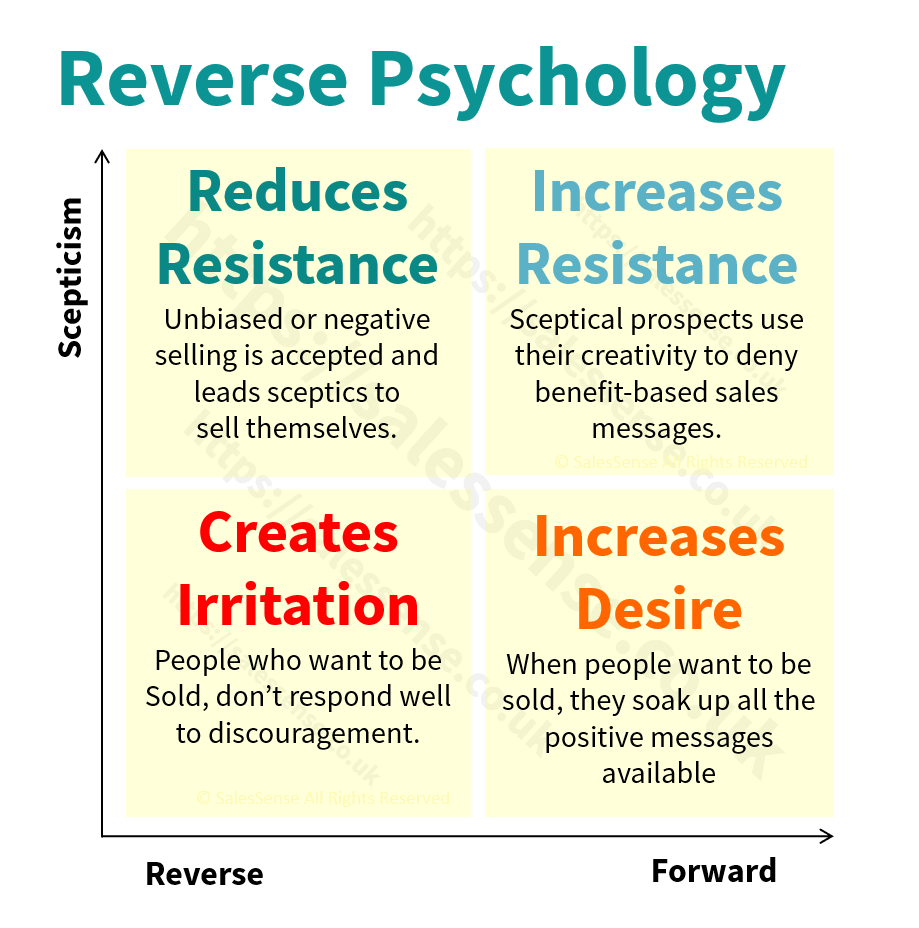Using selling skills with sales psychology for better outcomes.

No one likes to be manipulated into buying by clever use of sales psychology yet sometimes such tactics have the tacit support of the buyer.
Sales Psychology
People who want something, want to hear evidence that that supports a decision to acquire it. They want an excuse to go ahead.
Aversion to risk, uncertainty, and financial constraints stand in the way of a positive decision. So much so that people and organisations often miss opportunities or fail to do what they have set out to do. We don’t need someone to play devil's advocate. Each of us is fully competent in this role.
What we need is someone to counter our natural aversion to risk. Fear of failure, fear of losing self-respect, fear of seeming foolish to others or of parting with hard-won funds, creates plenty of resistance to taking action in the pursuit of goals and objectives.
What we need is an argument for doing what we want to do and salespeople are highly motivated to help. No one can be sold who doesn’t want to be. The picture of the desired end result is held far more vividly in the buyer’s imagination than the seller’s.
Alliance of Buyer and Seller
If you do buy something that fails to deliver what you expected then, either you misled yourself or someone helped you mislead yourself. It may have been deliberate or accidental, your disappointment is the same.
Professional sellers know that repeat business is essential to success. One study suggested that it is nine times easier to sell existing customers than new prospects.
Salespeople know that short-term gain is no compensation for the damage an unhappy customer does to their reputation, let alone all of the time taken up trying to solve the resulting problems.
Sharing in the responsibility for achieving a successful outcome is part of a salesperson’s lot and it is what the customer wants. Two people can carry a sofa more easily than one. Customers want sellers to help carry their project to a conclusion and professional salespeople are wholly committed to doing so.
Serving the Customer's Best Interests
How many people can you count who hold your best interests at heart, outside of your friends and close family?
Some of those who you employ, or help keep employed, might be included. You can quickly and easily categorise all the people you know according to how much they will consider you in their actions.
Don’t forget to count professional sellers among them. More than any wage earner, they know the value of their service. Their reward is your business and they know it cannot be taken for granted.
Free Consultant
Professional salespeople accumulate and maintain a great deal of knowledge about the markets and industries they sell into. They understand the strengths and weaknesses of competitive products as well as their own offerings.
The reference value of success stories ensures they memorise a wealth of knowledge about effective solutions to customer issues. They have free access to technical and commercial experts, either within the company they represent or from their suppliers.
If you pay for a consultant you expect to get an unbiased opinion. What you get is advice based on the experience and knowledge represented by the individual people you work with. No one organisation or individual can know it all so while the intent may honest, the result cannot help but reflect the specific human experiences.
At least you know the bias of a salesperson.
Astute sellers compensate for their known bias. They go out of their way to prove that they put the buyer's best interests first, even to the extent of advising them against their employer's best interests.
Adapting to the Customer's Perspective
Customers want salespeople to sell. They derive great benefits from interaction with professionals. They want the salesperson to wear their colours.
Which are worse, pushy, unprofessional sellers or those who insist that they are not selling? There is a middle ground where salespeople serve the conscious and unconscious needs of customers. Like yin and yang, yield when the customer pushes and push when the customer yields. Reverse psychology is yielding and framing benefits is pushing.
Sales psychology is the ability to correctly interpret both spoken and unspoken needs, even those that buyers don't know they have.
In Conclusion
Selling is about helping others get what they want. This isn't the exclusive occupation of salespeople. Everything has to be sold, from gaining agreement about a family outing destination to winning the support of managers and co-workers for a new project. Being persuasive rests on an understanding of sales psychology and the minds of others.
Salespeople earn a good living helping others do what they want to do. What more could one want from a career?
Article by Clive Miller
If you need to improve selling skills or learn sales psychology, we can help. Telephone +44 (0)1392 851500. We will be pleased to learn about your needs and talk through some options. Alternatively, send an email to custserv@salessense.co.uk for a prompt reply or use the contact form here.












